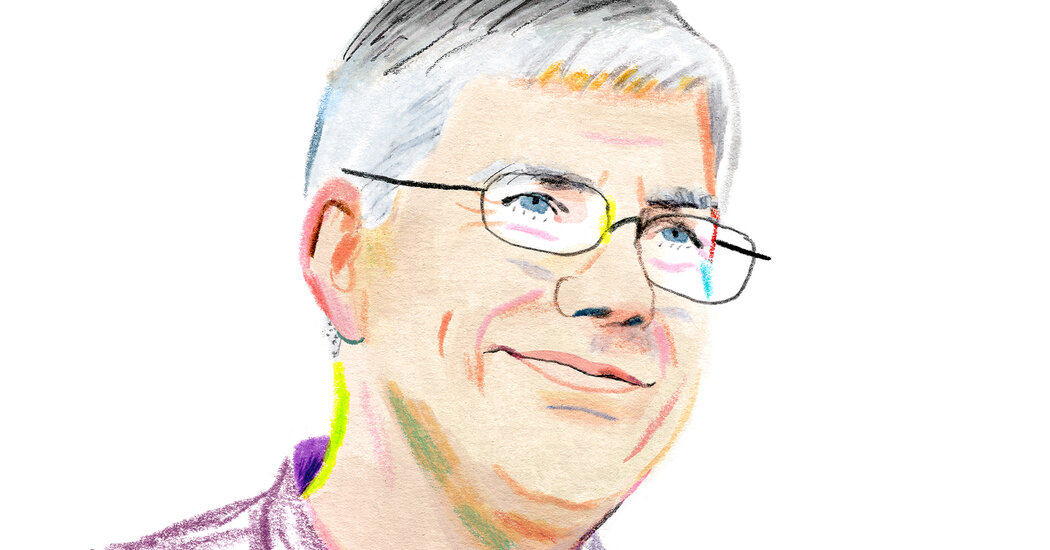
What books are on your night stand?
I usually have three books going at a time: one in Italian to improve my fluency, a novel in English and a nonfiction work in English. Right now it’s “Il Metodo del Coccodrillo,” a thriller by Maurizio de Giovanni, “Chain-Gang All-Stars,” a near-future dystopian novel by Nana Kwame Adjei-Brenyah, and “The Dark Valley: A Panorama of the 1930s” by Piers Brendon.
How do you organize your books?
“Organize” might be too kind a word. I try to group books loosely by subject matter. Celtic studies and books in Irish take up two shelves. Another two shelves are for books in Italian. Not surprisingly, Greek and Roman mythology takes up about four shelves. The rest is a scattered assortment of novels, nonfiction, poetry and graphic novels.
What’s the last great book you read?
“How to Live: Or, A Life of Montaigne,” by Sarah Bakewell. I was not well versed in Montaigne’s work, but I admire any biography that can bring its subject to life in such a vivid and relatable way.
Are there any classics that you only recently read for the first time?
“La Divina Commedia.” I had only read portions of the “Inferno” in English, but my Italian finally got to the level that I could tackle the “Commedia” in the original. It was quite a challenge and took me about a year, but it was well worth the effort to appreciate the poetry in its original form. What struck me was how topical and regional Dante’s references were. For such a timeless poem, it is deeply rooted in the personal dramas and “pop culture” of 13th-century Tuscany.
Which writers — novelists, playwrights, critics, journalists, poets — working today do you admire most?
So many. N.K. Jemisin has a brilliant iconoclastic imagination that has reframed fantasy and science fiction for me many times over. Madeline Miller has breathed new life into ancient Greek stories. China Miéville is a genius of speculative fiction whose quirky world-building always delights me. I also love the Irish-language poetry of Nuala Ní Dhomhnaill.
Describe your ideal reading experience (when, where, what, how).
I am lucky enough to have a home office with a large window looking over the Charles River in Boston. During the winter evenings, when the trees are bare and the view is wide open, the sunset on the water is spectacular. With the fireplace going and a bit of soft instrumental music playing … I can’t imagine a better place for enjoying a good book.
What kind of reader were you as a child?
Reluctant. I rarely read assigned texts in school, and reading for pleasure wasn’t something that would have occurred to me. That changed when I discovered “The Lord of the Rings,” which was my gateway into fantasy, and from there into mythology and the wider world of literature. I like to say that my karmic punishment for never reading an English text in school was becoming an English teacher.
What book should everybody read before the age of 21?
I don’t really believe in a canon of must-read texts for everyone. My gateway books were J.R.R. Tolkien’s. Would I recommend them to most 12-year-old kids today to get them interested in reading? Probably not. The most formative books I had read by age 21 were probably Faulkner’s “As I Lay Dying” and “The Habit of Being,” a collection of letters by Flannery O’Connor. Great books, but again, I am not sure I would make them blanket recommendations for every young adult today.
What is the best writing advice you have ever gotten?
To avoid the cycle of dissatisfaction. Before I was published, I took a class from a mystery novelist who warned me that writing could turn into a succession of moving goal posts. It can be easy to lose sight of why a writer writes — because you have an internal need to turn your thoughts into words.
What do you write when you sign books for fans?
I usually sign 1,000-5,000 books at a time, in advance of each event, so alas, I don’t get to personalize many books anymore. My signature has become an illegible scrawl. On those rare occasions when I get to have a one-on-one interaction with a fan, I try to add a few vowels and consonants to my scrawl, and perhaps sketch a lightning bolt underneath.
Do you count any books as guilty pleasures?
Any time I relax and enjoy a book rather than working, or cleaning the house, or running errands, I consider that a guilty pleasure. The type of book doesn’t matter.
Which subjects do you wish more authors would write about?
This is a complex ask, but I would personally love to read more anthologies of Indigenous folklore and mythology from around the world. When my family and I were traveling through the Pacific Northwest last summer, through the lands of the Tlingit, Haida and Chugach, we heard such wonderful stories. I’d love to learn more. Perhaps those books are out there and I’ve simply been unsuccessful finding them, or perhaps the books are not getting the coverage and attention they deserve. It’s also possible some Indigenous writers are wary of popularizing their sacred stories for a mass-market audience, which is totally fair.
You’re organizing a literary dinner party. Which three writers, dead or alive, do you invite?
I don’t do dinner parties, so I would probably invite the most introverted writers I could think of — perhaps Charlotte Brontë, Jane Austen and Emily Dickinson — because none of them would show up. Then we could enjoy a quiet evening at home by ourselves, reading by the fire.
